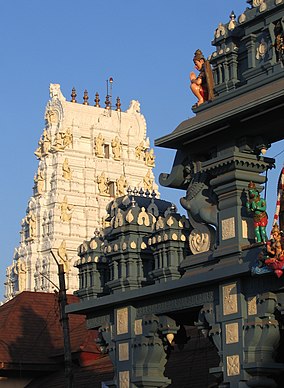All About Bharatiya Sanatana Dharmam otherwise known as Hinduism : 15. Continued- Swami Sivananda.
*Udupi, Sri Krishna Temple established by Swami Madhvacharya.
================================================
Thursaday, February 09, 2023. 06:00.
Chapter-12.
Hindu Philosophy-II
(The Schools of Vedanta)
=========================================================================
THE DVAITA PHILOSOPHY OF SRI MADHVACHARYA :
=========================================================================
The Entrance to Sri Krishna Matha at Udupi
INTRODUCTION :
Sri Madhvacharya evolved a dualistic system of philosophy out of the Prasthana-Traya,
viz., the Upanishads, the Bhagavad-Gita and the Brahma Sutras. It is an unqualified dualism.
Madhva’s Vaishnavism is called Sad-Vaishnavism, in order to distinguish it from the Sri
Vaishnavism of Ramanujacharya.
Madhva makes an absolute distinction between God, and animate and inanimate objects.
God is the only independent Reality. The animate and inanimate objects are dependent realities.
Madhva’s Vedanta is the doctrine of absolute differences. It is an Atyanta-Bheda-Darsana. He
insists on five great distinctions (Pancha-Bheda), viz., (i) the distinction between God and the
individual soul, (ii) the distinction between God and matter, (iii) the distinction between the
individual soul and matter, (iv) the distinction between one soul and another and (v) the distinction
between one material thing and another. Madhva’s philosophy is a philosophy of distinction. Every
follower of the Madhva school should have a firm belief in this fivefold distinction, known as the
Pancha-Bheda.
You can clearly grasp Sri Madhvacharya’s philosophy if you study his commentary on the
Brahma Sutras and Anu-Vyakhyana, his commentaries on the Upanishads and the Bhagavad-Gita,
and his glosses on the Mahabharata (Bharata-tatparya-nirnaya) and on the Bhagavata Purana.
Madhva’s philosophy has many points in common with those of Ramanuja. In Madhva’s
system of philosophy, Hari or Vishnu is the Supreme Being. The world is real. Difference is true.
All the Jivas are dependent on Hari, the Lord. There are grades of superiority and inferiority among
the individual souls. Liberation is the individual soul’s enjoyment of its innate bliss. This is Moksha
or the final emancipation. Bhakti, or devotion, without faults, is the means of attaining Moksha.
Perception, inference and the scriptures are the three Pramanas, or ways of knowledge. Hari is
knowable only through the Vedas. Worship of Lord Krishna as taught in the Bhagavata Purana is
the centre of his religion. This is the quintessence of Madhva’s teachings.
Sri Madhvacharya
THE CATEGORIES :
According to Madhva, Padartha or objective reality is of two kinds—independent
(Svatantra) and dependent (Paratantra). God, the Supreme Being, is the only independent Reality.
The soul and the world are dependent realities. God rules them. The dependent beings are of two
varieties—positive and negative. Conscious souls (Chetana), and unconscious entities like matter
and time (Achetana), are the two varieties of the positive. Unconscious entities are either eternal
like the Vedas, or eternal and non-eternal like Prakriti, time and space or non-eternal like the
products of Prakriti.
THE SUPREME BEING AND HIS CONSORT :
The Supreme Being is Vishnu or Narayana. He is the personal first cause. He is the
Intelligent Governor of the world. He lives in Vaikuntha along with Lakshmi, His consort. He and
His consort Lakshmi are real. Brahma and Vayu are two of His sons. One can know His nature
through a study of the Vedas. He manifests Himself through various Vyuhas or Group-forms, and
through Avataras. He is present in the sacred images. He is also the Antaryamin or the Inner
Controller of all souls. He creates, maintains and destroys the world.
God is free from Doshas or faults. He is endowed with all auspicious qualities. He is
omnipresent or all-pervading and independent. He is beyond time and space. He is greater than
Lakshmi. There is no other who is greater than Lakshmi. She is the foremost of the dependents.
Lakshmi is the Lord’s Sakti or energy. She is the personification of His power or creative energy.
Lakshmi can put on various forms without a material body. She is co-eternal with Vishnu and
all-pervading. She beholds the glory of Her Lord through eternity. She is Nitya-Mukta, i.e.,
eternally free from Samsara. She is not affected by sorrow and pain. She is intelligent.
*****
Next
PRAKRITI—THE MATERIAL CAUSE OF THE WORLD
=========================================================================





.jpg)

Comments
Post a Comment